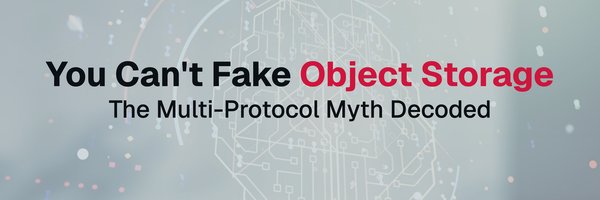
There's a disconnect at the center of most AI and analytics infrastructure. Whether it's GPU-accelerated model training or petabyte-scale Spark and Presto queries, modern workloads have pushed compute, networking, and orchestration forward. But data storage often remains anchored to architectures designed decades ago for different workloads. The result: state-of-the-art infrastructure bottlenecked by storage systems that can&
Read more

Technical catalogs track table state at the storage layer. Platform catalogs federate technical catalogs within an ecosystem. Business catalogs span the entire organization. Most organizations need all three layers working together.
Read more

On-premises data should participate in cloud AI/ML workflows without copying it anywhere. Delta Sharing should be embedded directly into object storage, eliminating separate servers and infrastructure. Data stays put. Queries travel.
Read more

Executive Summary
Nomura’s Risk Advisory division transformed its data infrastructure by modernizing from an aging Hadoop environment to a hybrid object-native data lakehouse powered by MinIO AIStor. This shift delivered measurable gains in performance, stability, and scalability, reducing operational costs and risk, while improving data availability and supporting future AI and analytics workloads.
Key benefits included:
* Performance: Benchmarking demonstrated
Read more

Today, we're excited to announce two new subscription tiers for MinIO AIStor: Free and Enterprise Lite, joining our existing Enterprise subscription.
Read more

1. Executive Summary
A global financial institution modernized its Data Analytics Platform, shifting from legacy, appliance-based storage to a high-performance, cloud-native MinIO AIStor-powered data lakehouse. This transition cut deployment time by 50%, maximized data insights, boosted AI model efficiency, improved existing analytics workflows, and enabled entirely new AI-driven use cases.
2. The Environment
Like many global financial institutions, this organization
Read more

Executive Summary
AMD, a global leader in high-performance computing, graphics, and semiconductor technologies, faced challenges with its internal engineering systems. Their systems, including ServiceNow, Jira, GitHub repositories, telemetry pipelines, and infrastructure logs, were developed independently over time, but they were deeply interconnected. This created data silos that obscured the connections across the engineering lifecycle, hindering AMD's agility in
Read more

MinIO AIStor is now “Awardable” in the CDAO Tradewinds Marketplace. This confirms the solution as a secure, scalable, high-performance data foundation for AI.
Read more

AI has shifted the baseline for infrastructure, from managing petabytes to operating seamlessly at exabyte scale. Agentic systems, long-context language models, simulation pipelines, and large-scale observability now demand storage architectures purpose-built for this data reality.
Today we’re thrilled to announce ExaPOD, MinIO’s validated reference architecture for the exascale era: a one-exabyte, highly dense and efficient building block that
Read more

MinIO has appointed Ran Kurup as its new Chief Corporate Development Officer, marking the start of the company’s next phase of strategic growth in the AI infrastructure era. Kurup joins MinIO after two decades at Intel, including nine years at Intel Capital, where he led global portfolio development and worked closely with high-growth technology companies across AI, data infrastructure,
Read more

Government agencies must modernize data to achieve AI readiness. Unified, secure, and actionable data enables real-time decisioning and creates a foundation for mission-aligned AI.
Read more

Our customer, a large electric utility company with millions of users, was faced with challenges common to utility and energy companies around the world: how to manage ever-growing energy demands, while diversifying energy supply to incorporate renewable and sustainable sources. A key element of their strategy is a smart metering initiative - bringing the power of technology and AI to
Read more

As a MinIO Curriculum Engineer, I spend a lot of time creating demos and learning environments for customers. These environments need to be realistic, comprehensive, and ready to showcase MinIO AIStor's capabilities in real-world scenarios. But here's the thing - setting up a proper demo environment manually can take hours of low-value, repetitive work.
Let me
Read more

1. Executive Summary
Our customer, a global telecommunications leader, established a Data Platform team to transform how data improved customer experiences and business operations. Faced with ballooning data growth and legacy storage constraints, they replaced aging legacy data storage systems with a high-performance, cloud-native data lakehouse, built on MinIO’s AIStor. The result: a scalable, cost-efficient foundation ready for AI,
Read more

A major US-based defense contractor needed to create an internal solution that allowed for the secure sharing of critical information with other allies and sensitive actors – a portable data lakehouse that could be scaled up and down on demand and deployed anywhere in the world, across a wide variety of deployment options and in challenging network environments.
Environment: Mission-critical applications
Read more

This global digital payments provider has provided online payment systems for nearly 30 years, seeing its highest rates of growth over the past ten years. Its user base expanded from over 150 million to more than 400 million customers worldwide which boosted its total payment volume from $200 billion to more than $1.5 trillion.
This led to their data
Read more

1. Executive Summary
A leading national payment and financial infrastructure provider transformed its analytics and fraud detection capabilities by migrating from a legacy Hadoop system to a modern data lakehouse powered by MinIO AIStor and Trino on Kubernetes. The shift delivered a 65% reduction in fraud model runtime, a fivefold increase in workload capacity, and significant cost savings by replacing
Read more

In the rapidly evolving TechBio industry, one innovative life sciences company puts technology at the forefront of its approach to drug discovery and experimentation. They operate one of the fastest privately owned supercomputers in the pharmaceutical sector, enabling unprecedented computational scale in biological research. Powered by a bespoke and AI-driven scientific operating system, their mission is to transform and accelerate
Read more

Government agencies must embrace AI responsibly, ensuring data sovereignty and security are top priority. To obtain sovereign AI, the right foundation must be in place to ensure infrastructure, data, and models remain fully controlled across agencies.
Read more

AIStor Tables brings Iceberg catalogs natively into on-prem object storage. It simplifies data organization, enforces table-aware security, and lets AI teams catalog unstructured assets in structured tables, thereby enabling discovery.
Read more


























